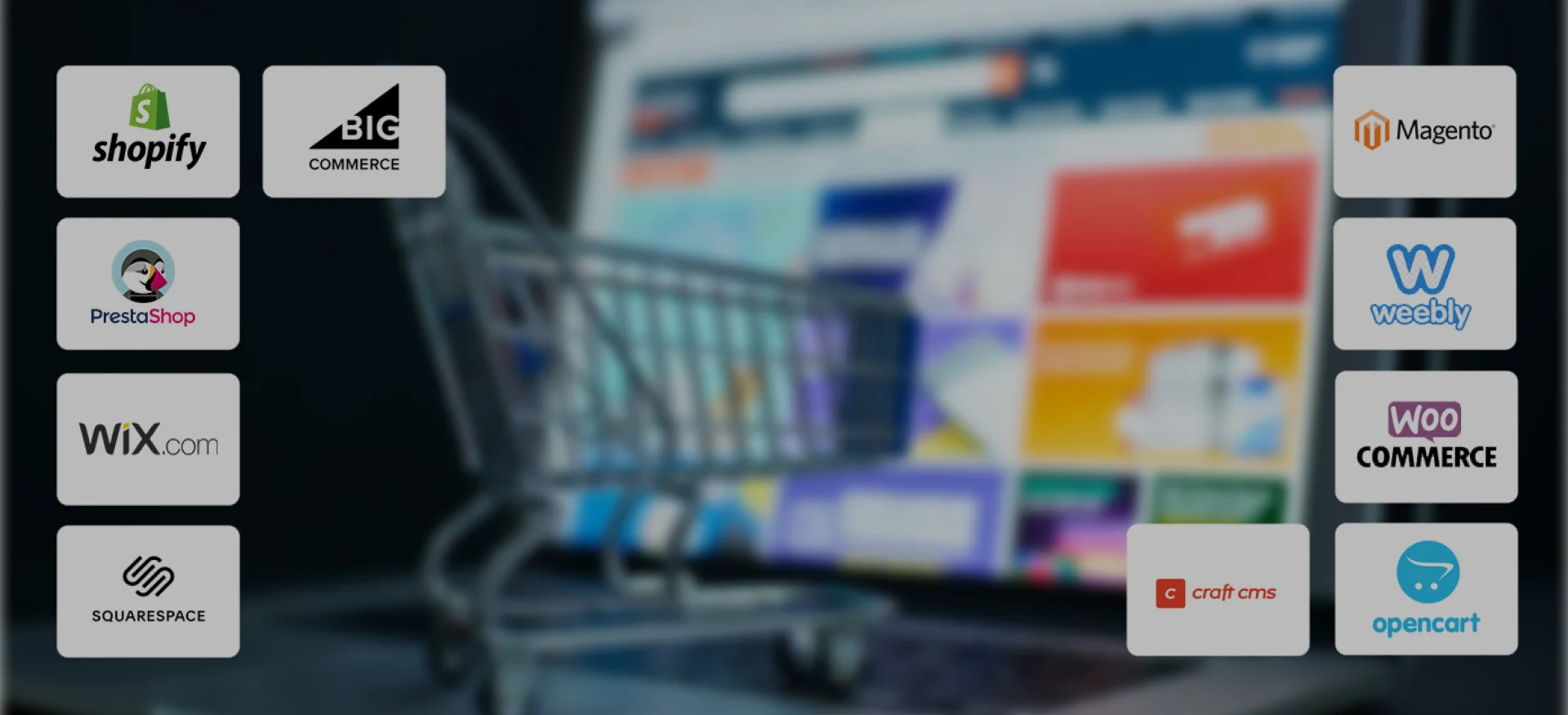An eCommerce platform is a software solution that enables businesses to create, manage, and expand their online stores.
These platforms provide all the necessary tools for managing products, processing payments, managing customer orders, shipping, and integrating marketing efforts.
Whether you’re a small business or a large enterprise, choosing the right eCommerce platform is crucial, as it affects scalability, user experience, and the overall success of your online business.
The best eCommerce platforms not only support product management and payment processing but also offer features like mobile optimization, customizable themes, SEO tools, and integrations with other systems like social media or inventory management tools.
The platform you choose should align with your business goals, technical capabilities, and customer needs.
Popular eCommerce platforms like Shopify, WooCommerce, Magento (Adobe Commerce), BigCommerce, and Wix eCommerce cater to various business sizes and requirements.
For example, Shopify is known for being beginner-friendly, WooCommerce is ideal for businesses already using WordPress, and Magento offers high customization for larger businesses with complex needs.
Choosing the right platform can make a significant difference in your online store’s performance, so understanding your business needs is key.
What is an eCommerce Platform?
An eCommerce platform is a comprehensive software solution designed to help businesses operate their online stores efficiently and effectively.
These platforms offer a range of integrated tools that enable companies to manage every aspect of their online presence, from product listings to customer interactions.
By centralizing all essential eCommerce functions, such platforms provide a seamless experience for both business owners and customers.
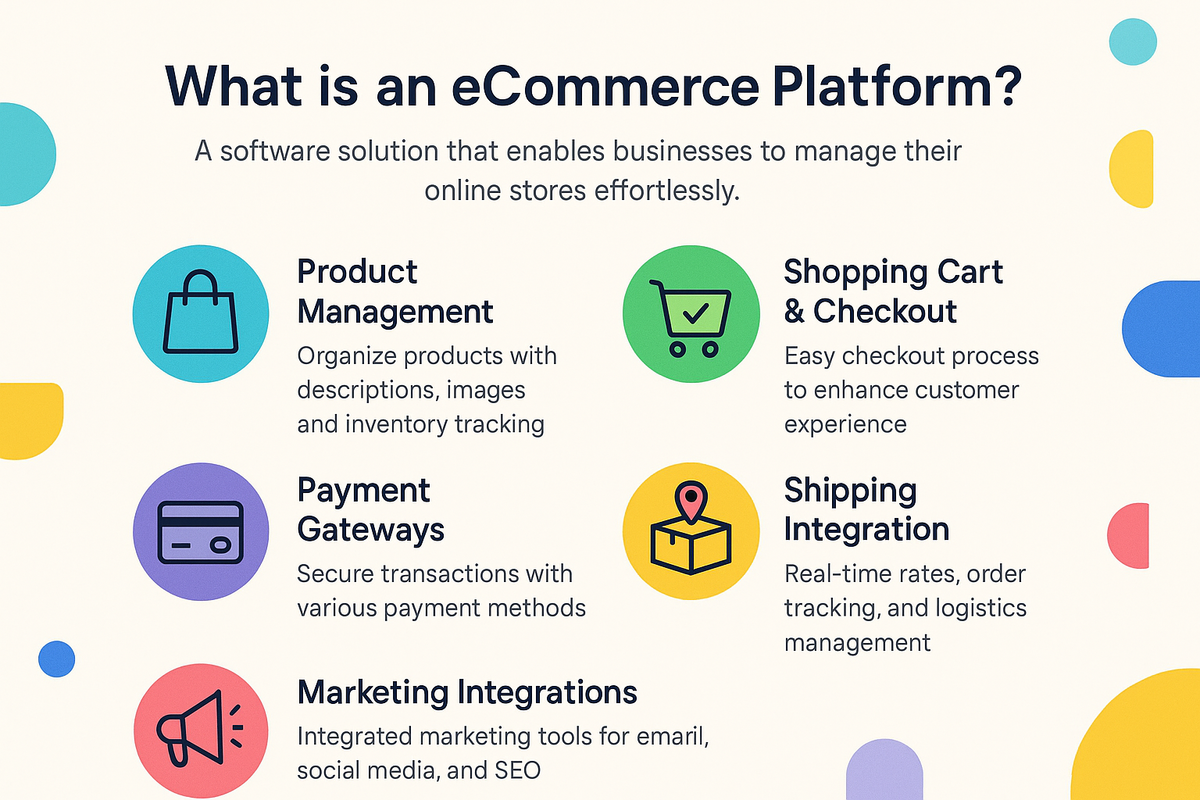
Key components of an eCommerce platform include:
1. Product Management
This allows businesses to organize and showcase their products effectively. It includes features for adding product descriptions, images, inventory tracking, categorization, and pricing, enabling businesses to offer a wide variety of products in an organized and accessible manner.
2. Shopping Cart & Checkout
These are critical for providing a user-friendly shopping experience. The shopping cart holds the selected items, while the checkout process facilitates order confirmation, payment, and shipping details. A smooth checkout process reduces cart abandonment and enhances the customer journey.
3. Payment Gateways
These systems process financial transactions securely. eCommerce platforms support various payment methods, including credit/debit cards, digital wallets, and third-party processors like PayPal, ensuring flexibility for customers worldwide.
4. Shipping Integration
Shipping tools are integrated into the platform to calculate real-time shipping rates, track orders, and manage inventory. This feature helps businesses streamline logistics, provide accurate shipping quotes, and track orders to ensure timely deliveries.
5. Marketing Integrations
eCommerce platforms integrate with tools for email marketing, social media, affiliate marketing, and SEO. These tools help businesses reach a wider audience, track customer behavior, , and optimize marketing campaigns to increase conversion rate and drive long-term sales growth.
Additionally, the platform’s ability to scale as the business grows ensures that operations remain efficient, even as product offerings expand or traffic increases.
Many companies also rely on specialized eCommerce marketing services to boost visibility, while enterprise-level brands often integrate B2B marketing strategies and leverage performance marketing to maximize return on investment.
Also Read: What is Ecommerce
Explore Our eCommerce Marketing Services!
5 Best ECommerce Platforms
Here are some popular eCommerce platforms, each catering to different business needs:
- Shopify
- WooCommerce
- Magento (Adobe Commerce)
- BigCommerce
- Wix eCommerce
Let’s explore each.
1. Shopify

Shopify is the perfect choice for entrepreneurs or small business owners who may not have a deep technical background but still want to build a professional online store.
It’s designed to offer a smooth, user-friendly experience, allowing users to set up and manage an e-Commerce site without the need to hire developers or designers.
Here's how Shopify caters specifically to small and medium-sized businesses:
Shopify offers an intuitive interface, customizable themes, secure payment processing, reliable hosting, and an extensive app marketplace to help businesses build, manage, and grow their online stores, and many new entrepreneurs often ask how does Shopify work when starting out.
Some of the key features are:
- User-Friendly Interface: Shopify is designed for users with limited technical knowledge, offering an intuitive drag-and-drop interface that makes store setup quick and easy.
- Extensive App Marketplace: Shopify boasts a wide range of apps and integrations, allowing businesses to enhance their stores with additional features like marketing tools, shipping solutions, accounting software, and customer support services.
- Customizable Themes: Shopify provides a variety of customizable themes, both free and paid, enabling businesses to create a store that aligns with their brand’s look and feel. Users can modify the design with no coding knowledge, or dive into the code for more advanced customizations.
- Reliable Hosting & Security: Shopify provides secure and fast hosting, with 99.9% uptime and SSL encryption for safe transactions. The platform takes care of all the server management, ensuring a hassle-free experience for business owners.
- Mobile Optimization: Shopify ensures that your store is optimized for mobile devices, offering a seamless shopping experience for users on smartphones and tablets.
- Payment Gateway Integration: Shopify supports multiple payment gateways, including its own Shopify Payments, PayPal, and third-party processors, making it easy to accept payments from customers worldwide.
- 24/7 Customer Support: Shopify offers 24/7 support through live chat, email, and phone, ensuring that businesses always have assistance when needed.
- SEO Features: Built-in SEO features such as customizable title tags, meta descriptions, and URL structures help improve search engine visibility and drive organic traffic to your store.
- Scalability: Shopify grows with your business, offering various plans to accommodate increasing product inventories and higher traffic volumes, making it suitable for long-term growth.
Entrepreneurs and businesses looking for an easy-to-use, dependable eCommerce platform that requires minimal setup, offers excellent customer support, and can scale as their business grows.
2. Woo Commerce
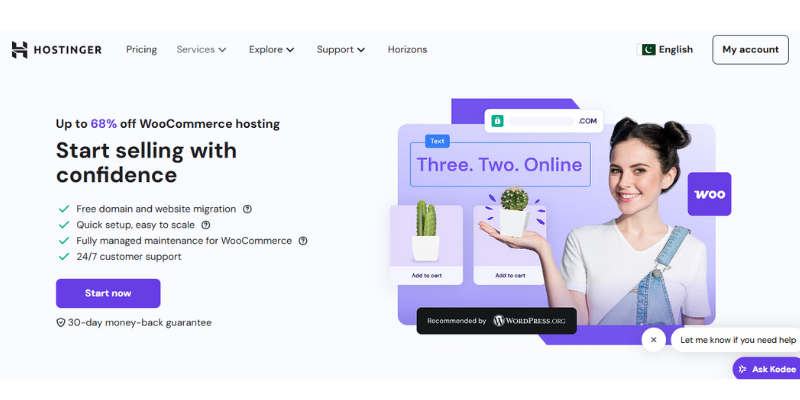
WooCommerce is an open-source plugin for WordPress, offering an ideal solution for businesses looking for complete control and customization over their online store.
As a content-driven eCommerce platform, it seamlessly integrates with WordPress, allowing businesses to leverage its powerful content management system (CMS) for driving traffic and engaging customers.
Some of the key features are:
- Open-Source: WooCommerce is free and fully customizable, providing businesses with complete control over store functionality and design.
- Highly Customizable: With numerous plugins and themes available, WooCommerce can be tailored to suit any niche, adding features and integrations as needed.
- Content-Driven eCommerce: Perfect for businesses that rely on content marketing, WooCommerce integrates well with WordPress to help boost SEO and customer engagement.
- Flexible Payment Options: WooCommerce supports various payment gateways, including PayPal, Stripe, and credit cards, providing customers with multiple payment methods.
- Scalable: Whether you’re managing a small inventory or a large product catalog, WooCommerce can handle growing product lines and business expansions.
Strong Community Support: Backed by the extensive WordPress ecosystem, WooCommerce benefits from a large community of developers and experts who offer continuous support and enhancements.
For businesses that are already familiar with WordPress and need an adaptable, content-focused solution, WooCommerce offers all the tools to create a successful and scalable online store, making it one of the best website builders for small business that rely heavily on content marketing.
3. Magento (Adobe Commerce)
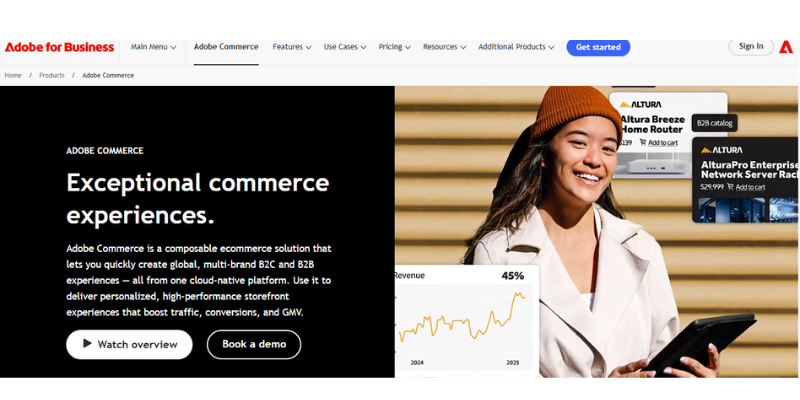
Magento, now part of Adobe Commerce, is a highly flexible and feature-rich eCommerce platform designed to meet the needs of businesses that require advanced functionality, scalability, and customization.
It’s ideal for businesses looking to deliver a tailored, enterprise-level shopping experience while retaining full control over their store’s performance and infrastructure.
Some of the key features are:
- High Flexibility and Customization: Magento provides extensive customization options, allowing businesses to tailor both the front-end and back-end of their store, creating a unique shopping experience.
- Enterprise-Level Functionality: Offers a wide range of advanced features such as multi-store capabilities, advanced search options, customer segmentation, and robust analytics.
- Scalable: Magento can handle large product catalogs and high traffic volumes, making it suitable for growing businesses or enterprise-level operations.
- Open-Source: Magento's open-source version provides businesses with full control over code, enabling deep customization.
- Integration Capabilities: Easily integrates with third-party tools and services, including ERP, CRM, and marketing platforms, enhancing business operations and customer engagement.
- Robust Security: Offers enterprise-grade security features to protect sensitive customer and transaction data.
Magento is best suited for businesses that need a high degree of customization and flexibility, along with the infrastructure to manage and scale their store as it grows, especially for enterprises evaluating what are five marketing strategies that retailers spend half of their annual budget on? to align with advanced features.
It is ideal for enterprise-level operations that require advanced functionalities and have the technical resources to manage the platform effectively.
Explore Our Digital Marketing Services!
4. Big Commerce
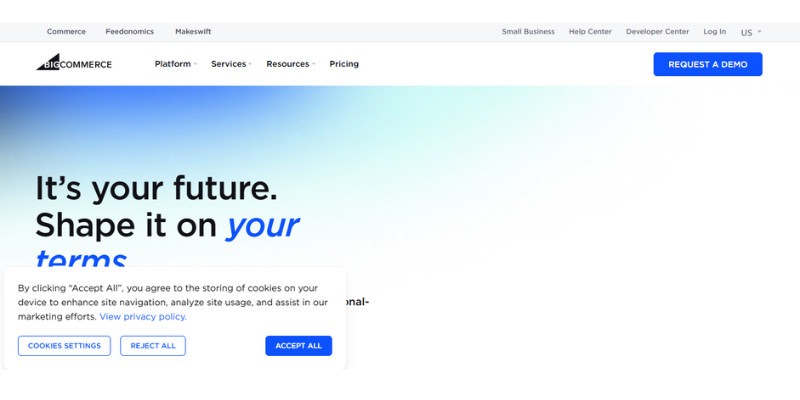
BigCommerce is a versatile eCommerce platform designed for businesses that are outgrowing basic solutions and need more advanced capabilities.
It provides a strong foundation for scaling, offering a range of features and integrations that cater to businesses looking to expand their product offerings, increase their reach, and optimize their operations.
Some of the key features of BigCommerce are:
- Strong Multi-Channel Selling: BigCommerce allows businesses to sell across multiple platforms like Amazon, eBay, Facebook, and Instagram, expanding their reach and streamlining management from one central dashboard.
- Robust SEO Tools: With built-in SEO features, BigCommerce helps optimize product pages, meta descriptions, and URLs, improving visibility in search engines and driving organic traffic.
- Comprehensive Integrations: The platform integrates with a wide variety of third-party apps, payment gateways, CRM systems, and marketing tools, enabling businesses to automate processes and manage operations seamlessly.
- Scalable Infrastructure: Designed to handle growth, BigCommerce can support a large product catalog, multiple payment methods, and high transaction volumes, making it ideal for expanding businesses.
- User-Friendly: Despite its advanced capabilities, BigCommerce maintains an intuitive interface that makes it easy for users to manage their online stores without a steep learning curve.
- Advanced Reporting & Analytics: The platform provides detailed reporting features to track sales performance, customer behavior, and marketing effectiveness, helping businesses make data-driven decisions.
BigCommerce is perfect for growing businesses that need to scale quickly, integrate with various tools, and expand across multiple sales channels while maintaining a user-friendly experience, making it highly compatible with what is the digital marketing strategy that tracks users across the web? through advanced integrations.
5. Wix E-Commerce
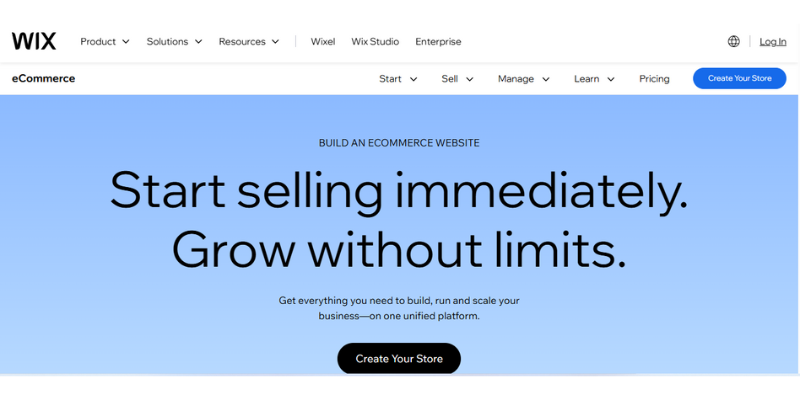
Wix eCommerce is an ideal solution for those who want to get started quickly and easily with an online store.
It’s a user-friendly platform that doesn’t require any technical knowledge, offering a simple drag-and-drop interface for building a professional online store without the need for designers or developers.
Some of it’s Key features are:
- Drag-and-Drop Website Builder: Wix provides an intuitive, drag-and-drop website builder that allows users to create and customize their online store easily, even with no coding experience.
- Low-Cost Solution: With affordable pricing plans, Wix eCommerce offers a cost-effective way for entrepreneurs and small businesses to set up and maintain an online store.
- Simple Integration: Wix seamlessly integrates with payment gateways, shipping options, and marketing tools, allowing businesses to manage all aspects of their store from one platform.
- Customizable Templates: Choose from a variety of professionally designed templates that are mobile-responsive and customizable to suit your brand.
- Basic eCommerce Features: Includes essential eCommerce functionalities such as product management, inventory tracking, secure checkout, and easy payment processing.
- Marketing Tools: Wix offers built-in tools for email marketing, SEO, and social media integration, enabling small businesses to reach a wider audience and boost sales.
Wix eCommerce is best for businesses that prioritize ease of use and affordability over extensive customization, and it often sparks comparisons with questions like is Shopify legit when entrepreneurs evaluate low-cost solutions. It’s a great option for those starting out with an online store who want a hassle-free setup and management process.
Comparison of Top 5 Ecommerce Platforms
Explore a comparison of key features and pricing for popular ecommerce platforms.
| Feature | Shopify | WooCommerce | Magento (Adobe Commerce) | BigCommerce | Wix eCommerce |
|---|---|---|---|---|---|
| Overall Rating | ★★★★☆ | ★★★☆☆ | ★★★★☆ | ★★★★☆ | ★★★☆☆ |
| Best For | Entrepreneurs, Small Businesses | WordPress Users | Enterprises, Customization | Growing Businesses | Beginners, Small Businesses |
| Ease of Use | Beginner-friendly | Requires WordPress Knowledge | High technical skills needed | User-friendly, Scalable | Extremely beginner-friendly |
| Customization | Highly customizable themes | Fully customizable, open-source | Extremely flexible, advanced features | Scalable with integrations | Basic customization, Drag-and-drop |
| Key Features | User-friendly, app marketplace, 24/7 support, mobile optimized | Open-source, flexible payment options, content-driven | High flexibility, enterprise-level, robust security | Multi-channel selling, SEO tools, integrations | Drag-and-drop builder, affordable, marketing tools |
| Scalability | Scalable for small & medium growth | Scalable with technical resources | Best for enterprise-scale operations | Great for growing businesses | Limited scalability for small shops |
| Pricing | From $29/mo | Free (additional costs for hosting) | Requires technical setup & hosting | From $29.95/mo | From $23/mo |
| Payment Gateways | Shopify Payments, PayPal, Stripe | PayPal, Stripe, credit cards | Wide range of options | Multiple gateways, third-party integrations | Integrated with payment systems |
| Transaction Fees | 2.9% + $0.30 per transaction | Varies based on payment processor | Customizable, depends on setup | 2.9% + $0.30 per transaction | Transaction fees vary by plan |
| Support | 24/7 support (chat, email, phone) | Community-based support | Requires technical expertise for support | 24/7 support (chat, email, phone) | Limited support for basic plans |
| Free Plan | No | Yes (Open-source, but requires hosting) | No (open-source with hosting) | No | Yes (basic features, eCommerce not included) |
Choosing the Best Ecommerce Platform: Features Checklist for Business Success
When selecting the best ecommerce platform for small business, it’s essential to evaluate a range of features that will directly impact your ability to grow and manage your online store effectively. Every business has unique needs, and the best ecommerce platform for one business might not be the right choice for another. To help guide your decision, we've created a comprehensive ecommerce platform checklist based on essential features that will support your current and future business goals.
9 Key Features to Consider When Choosing an Ecommerce Platform
1. Secure and Reliable Checkout & Payment Gateways
A smooth and secure checkout process is crucial for reducing cart abandonment and building trust with customers. Look for platforms that offer secure payment gateways like PayPal, Stripe, and mobile wallets. Shopify, for example, integrates with over 100 payment gateways and provides Shop Pay, which speeds up the checkout process by four times, making it an excellent option for small business ecommerce.
2. Online and Offline Selling Options
Many businesses today need to integrate both online and offline selling channels. Choose a platform that supports a seamless point-of-sale (POS) system, like Shopify, which syncs both online and in-person transactions. Consider whether the platform offers POS hardware options and mobile capabilities for events and pop-up shops.
3. AI Assistance for Efficiency
Artificial Intelligence (AI) is revolutionizing ecommerce. Platforms like Shopify, with its Shopify Magic and Sidekick AI, can assist in writing product descriptions, editing images, and even providing personalized customer support. AI assistance can be a game-changer, helping small businesses save time and optimize store management.
4. Hosting Environment and Performance
Your hosting environment impacts both performance and security. Some ecommerce platforms for small business, like Shopify, provide included hosting, ensuring reliability and security without additional costs. If you prefer more control, you may opt for self-hosting, but be prepared for more management and security responsibilities.
5. Inventory Management and Shipping
A robust inventory management system is crucial for smooth operations. Look for a platform that allows easy tracking of stock levels, integrates with shipping carriers, and offers automated fulfillment. These features will save time, streamline logistics, and improve customer satisfaction.
6. Marketing and Customer Growth Tools
Marketing is key to business growth. Platforms like Shopify and BigCommerce provide advanced SEO tools, email marketing integrations, and social media syncing to help you grow your audience. Some platforms also offer customer loyalty programs, personalized recommendations, and segmentation to help you target specific customer groups.
7. Security Features
Security is non-negotiable. Ensure your platform includes SSL certificates, two-factor authentication, and PCI DSS compliance for secure transactions. A reliable security setup protects your business and customer data, which is crucial for building trust.
8. Business and Financial Management Tools
The right platform should help you stay on top of your finances. Look for sales reporting, tax calculation, and accounting software integrations. These tools will help you streamline business operations, ensuring that you can focus on growth.
9. Support and Customer Service
Whether you are a new business or scaling up, reliable customer support is essential. Platforms like Shopify offer 24/7 customer support through phone, email, and live chat. Additionally, self-help resources such as tutorials and knowledge bases can assist with troubleshooting.
FAQs: Best ECommerce Platform
What is the best eCommerce platform for small business in 2025?
The best eCommerce platform for small business in 2025 depends on your specific needs. Popular platforms like Shopify, WooCommerce, and Wix offer excellent features for small businesses. Shopify is often considered the top choice due to its user-friendliness, scalability, and robust support, while WooCommerce offers flexibility for WordPress users. Wix is ideal for entrepreneurs seeking an affordable and easy-to-use platform.
What makes Shopify the best eCommerce platform for small businesses?
Shopify is considered one of the best eCommerce platforms for small businesses because of its intuitive interface, customizable themes, secure payment options, and 24/7 customer support. It also integrates with a wide range of third-party apps, making it easy to manage your store, whether you're a beginner or scaling up.
Which eCommerce platforms are best for small business in 2025?
In 2025, the best eCommerce platforms for small businesses include Shopify, WooCommerce, Wix, BigCommerce, and Magento. These platforms cater to different business sizes and technical requirements. Shopify leads for simplicity, while WooCommerce is perfect for businesses already on WordPress. Wix is great for cost-effective solutions, and BigCommerce excels at scalability and multi-channel selling.
How do I choose the best eCommerce platform for my small business?
To select the best eCommerce platform for your small business, consider your budget, technical expertise, and scalability needs. Shopify is ideal for businesses that prioritize ease of use, while WooCommerce is better for businesses that need customization. If you need multi-channel selling, BigCommerce might be the right choice.
What are the top eCommerce platforms for small business owners?
The top eCommerce platforms for small business owners include Shopify, WooCommerce, Wix, and BigCommerce. Shopify is known for its simplicity and robust features, WooCommerce offers deep customization for WordPress users, Wix is great for beginners, and BigCommerce excels in scalability and multi-channel sales.
Why is Shopify considered the best eCommerce platform for small businesses?
Shopify is often regarded as the best eCommerce platform for small businesses due to its user-friendly interface, secure payment gateway integrations, customizable themes, mobile optimization, and 24/7 customer support. It is a comprehensive, all-in-one solution, making it ideal for entrepreneurs who want to focus on growing their business without needing technical expertise.
Conclusion: Best eCommerce Platform
Choosing the right eCommerce platform is a critical decision for any business looking to succeed in the online marketplace. Whether you're just starting out or scaling up, there is a platform that can cater to your specific needs.
Shopify stands out for its user-friendliness and all-in-one solution, making it ideal for small businesses or entrepreneurs who need a straightforward setup with minimal technical expertise, much like the simplicity people compare in debates such as DuckDuckGo vs Google.
WooCommerce offers flexibility and customization for businesses already on WordPress, allowing for deeper control and integration with the platform's vast ecosystem, which is particularly helpful when businesses need to check Google keyword ranking for SEO-driven growth.
Magento is designed for larger businesses with complex requirements and the technical resources to manage a highly customizable, enterprise-level solution, , often supported by a tech marketing agency for implementation and growth.
For growing businesses, BigCommerce provides scalability and robust features, including multi-channel selling and advanced SEO tools, to expand as the business grows. On the other hand,
Wix eCommerce offers an easy-to-use and affordable option for small businesses or entrepreneurs who prioritize simplicity and cost-effectiveness.
By considering your business's size, technical capabilities, and long-term growth plans, you can select the best eCommerce platform to build, manage, and scale your online store successfully.
